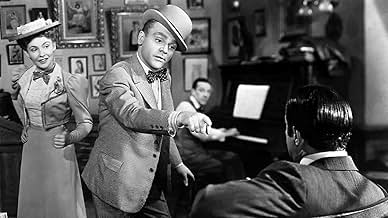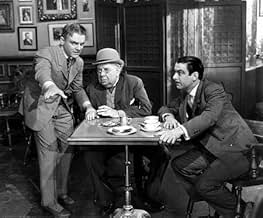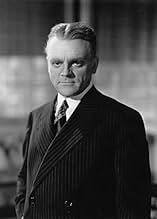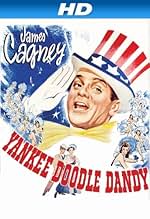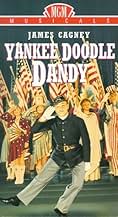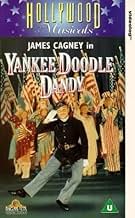AVALIAÇÃO DA IMDb
7,6/10
18 mil
SUA AVALIAÇÃO
A vida do renomado compositor musical, dramaturgo, ator, dançarino e cantor George M. Cohan.A vida do renomado compositor musical, dramaturgo, ator, dançarino e cantor George M. Cohan.A vida do renomado compositor musical, dramaturgo, ator, dançarino e cantor George M. Cohan.
- Direção
- Roteiristas
- Artistas
- Ganhou 3 Oscars
- 9 vitórias e 6 indicações no total
Patsy Parsons
- Josie Cohan - As a Girl of 12
- (as Patsy Lee Parsons)
Avaliações em destaque
There are many, many James Cagney films that show his enormous talent as an actor. He was equally at home in musicals, dramas and comedies. While I have always been a fan and appreciate his unusual scope, this movie in particular caught my eye and totally blew me away when the scene I'm about to describe unfolded.
Near the very end of the film Cagney's character (George M. Cohan) bids farewell to the President and leaves the room. There is a long, open staircase he starts walking down. As he walks you sense a bit of a bounce beginning to take over his step.....one that quickly gives way to an awesome dance as he navigates the stairway. Many will not note, but this dance was a fantastic achievement on two fronts. One, it was done in one "take"...that is, the camera never stopped; the scene never "cut." The camera stays with him in one shot all the way through. Second, Mr. Cagney never ONCE looks at his feet or down at the steps. It's almost impossible to WALK down a staircase without looking down or hanging on to a banister....this man DANCED down a staircase without benefit of seeing or touching anything.
Couple this feat with the brilliant display of "hoofing" he gives earlier in the film when he literally dances up the walls and you have a movie that deserves its "classic" rating. If you haven't seen it please make it a point to do so. Any movie that is awe inspiring 62 years later must be worth a peek, don't you agree?
Near the very end of the film Cagney's character (George M. Cohan) bids farewell to the President and leaves the room. There is a long, open staircase he starts walking down. As he walks you sense a bit of a bounce beginning to take over his step.....one that quickly gives way to an awesome dance as he navigates the stairway. Many will not note, but this dance was a fantastic achievement on two fronts. One, it was done in one "take"...that is, the camera never stopped; the scene never "cut." The camera stays with him in one shot all the way through. Second, Mr. Cagney never ONCE looks at his feet or down at the steps. It's almost impossible to WALK down a staircase without looking down or hanging on to a banister....this man DANCED down a staircase without benefit of seeing or touching anything.
Couple this feat with the brilliant display of "hoofing" he gives earlier in the film when he literally dances up the walls and you have a movie that deserves its "classic" rating. If you haven't seen it please make it a point to do so. Any movie that is awe inspiring 62 years later must be worth a peek, don't you agree?
James Cagney put down his tommy gun and grapefruit long enough to register his lone Oscar-winning performance in one of Hollywood's most enduring biopics, playing song-and-dance man George M. Cohan with so much gusto it's hard to believe the filmmakers wanted Fred Astaire, or that Cagney ever did anything else but musicals. Cohan himself probably didn't make as good a Cohan as Cagney does here.
The film is best-known for its musical moments, not only because of Cagney's clever hoofing but for the way the numbers are staged. When Cohan debuts his new song "You're A Grand Old Flag," the picture goes from being a relatively straight stage shoot to a series of logistically-improbable montages (a group of Boy Scouts give way to Revolutionary War troops, which melt into a knot of freed slaves gathered around a statue of Lincoln) that sell the history of the United States in all its glory. Finally, as the song winds to its big finish, hundreds and hundreds of uniformed flag bearers spill out on a stage suddenly too big to hold any conventional theater.
The overall effect of this is overwhelming enough to make you want to run out and buy War Bonds 60 years after the conflict "Yankee Doodle Dandy" was inspired by has ended. Patriotism may go out of style from time to time, but events happy and otherwise have a way of bringing it back.
The smaller touches make "Yankee Doodle Dandy" as entertaining as it is inspiring. Little Georgie gets too big for his britches when he tells a Brooklyn audience he can lick any kid in town, and gets put to the test. Older George and a partner beguile a producer (played by S.Z. Sakall, Carl from "Casablanca") into taking on a play no one else wants by pretending it's a hot property. George meets his future wife Mary in old-man costume, and can't resist having a little fun with her. "I know I have talent," Mary blurts, "even if I am from Buffalo."
Cagney does talk rather fast, and he needs to if only to keep pace with a frenetic storyline. Situations change rather quickly in "Yankee Doodle Dandy," and sometimes, as with George's sudden success and the later dissolution of the Four Cohans, it happens a bit too fast to follow. Cagney hardly pauses for breath. He's no singer, either, talking his way through his numbers like Rex Harrison in "My Fair Lady," only not as well.
But few films deliver the goods like "Yankee Doodle Dandy." You get a strong feeling for vaudeville entertainment, how mass entertainment worked in the gaslight age. The musical numbers (all done within the context of public performance, or else rehearsal, i.e. naturalistically) have real charm. The dialogue is great, too, a trifle canned and buffed-up maybe, but very Runyon-ish in its Stage Door Johnny way.
The best scene, for Cagney's acting and for comedy, is when he shows Mary a new song he wrote for her. The way his eyes move from her face to the score, prompting her unnecessarily, reveals both affection and the showman's inner ham. He almost looks menacing, but of course it's because he's smitten by the singer and trying to tell her through his song. It also sets up a great bit of comedy later on when George has to give Mary's song away to stage star Fay Templeton, then go back and explain it to Mary.
"He's the whole country squeezed into one pair of pants," exclaims one producer trying to get Templeton to hitch her wagon to Cohan's star. With Cagney wearing the pants, the end result is a perfect fit.
The film is best-known for its musical moments, not only because of Cagney's clever hoofing but for the way the numbers are staged. When Cohan debuts his new song "You're A Grand Old Flag," the picture goes from being a relatively straight stage shoot to a series of logistically-improbable montages (a group of Boy Scouts give way to Revolutionary War troops, which melt into a knot of freed slaves gathered around a statue of Lincoln) that sell the history of the United States in all its glory. Finally, as the song winds to its big finish, hundreds and hundreds of uniformed flag bearers spill out on a stage suddenly too big to hold any conventional theater.
The overall effect of this is overwhelming enough to make you want to run out and buy War Bonds 60 years after the conflict "Yankee Doodle Dandy" was inspired by has ended. Patriotism may go out of style from time to time, but events happy and otherwise have a way of bringing it back.
The smaller touches make "Yankee Doodle Dandy" as entertaining as it is inspiring. Little Georgie gets too big for his britches when he tells a Brooklyn audience he can lick any kid in town, and gets put to the test. Older George and a partner beguile a producer (played by S.Z. Sakall, Carl from "Casablanca") into taking on a play no one else wants by pretending it's a hot property. George meets his future wife Mary in old-man costume, and can't resist having a little fun with her. "I know I have talent," Mary blurts, "even if I am from Buffalo."
Cagney does talk rather fast, and he needs to if only to keep pace with a frenetic storyline. Situations change rather quickly in "Yankee Doodle Dandy," and sometimes, as with George's sudden success and the later dissolution of the Four Cohans, it happens a bit too fast to follow. Cagney hardly pauses for breath. He's no singer, either, talking his way through his numbers like Rex Harrison in "My Fair Lady," only not as well.
But few films deliver the goods like "Yankee Doodle Dandy." You get a strong feeling for vaudeville entertainment, how mass entertainment worked in the gaslight age. The musical numbers (all done within the context of public performance, or else rehearsal, i.e. naturalistically) have real charm. The dialogue is great, too, a trifle canned and buffed-up maybe, but very Runyon-ish in its Stage Door Johnny way.
The best scene, for Cagney's acting and for comedy, is when he shows Mary a new song he wrote for her. The way his eyes move from her face to the score, prompting her unnecessarily, reveals both affection and the showman's inner ham. He almost looks menacing, but of course it's because he's smitten by the singer and trying to tell her through his song. It also sets up a great bit of comedy later on when George has to give Mary's song away to stage star Fay Templeton, then go back and explain it to Mary.
"He's the whole country squeezed into one pair of pants," exclaims one producer trying to get Templeton to hitch her wagon to Cohan's star. With Cagney wearing the pants, the end result is a perfect fit.
`It seems it always happens
Whenever we get too high hat and sophisticated for flag-waving, some thug nation decides we're a pushover, all ready to be blackjacked. It's not long before we start looking up mighty anxiously to make sure the flag is still waving.'
So says James Cagney, as George M. Cohan, at the time of the sinking of the Lusitania in 1915. Obviously, it's a sentiment that has great relevance to our time, as well. I've always wished I could dance a patriotic dance or march down the street waving the flag. It looks like a lot of fun. The trouble is, this sort of activity is often performed to suppress what America is really about. The really great thing about our country isn't songs, flags and marches. Any country can do those things. The real great thing is that we have the right to say what we think, to debate the issues of the day and to form a consensus for action when we are in agreement about what needs to be done.
There was surely such a consensus when this film was made in 1942. There was little doubt about what needed to be done then. However, World War I seems now a particularly pointless conflict and the thought that smiling Frances Langford was singing soldiers into battle to who knows what fate is a little disturbing. And now, whenever there is a war, we are urged to join the parade and postpone debate until the issue is something not so important, like farm prices or college entrance requirements. It seems to me that the more important an issue is, the more we should be debating it. If people are going to die, we'd better make sure we are right.
From that point of view, `Yankee Doodle Dandy' can seem almost offensive. But, of course it isn't. Is a charming example of one of the thing Old Hollywood did best- the romantic biography. In this George M. is an all-right guy, an enormous bundle of energy that intimidates the stuffed shirts but causes people of substance to fall in love with him. He has a wonderful family and one of those `perfect' Hollywood wives- Mary, who doesn't even wince when he gives the song he wrote for her to another actress. He has a loyal friend and partner in Jed Harris. For some reason he's childless but still gets a thrill from performing for his beloved audiences. And, when his country needs a shot in the arm, his enthusiastic songs provide it.
Of course, he was married twice. His divorce from his first wife Ethel, was acrimonious and thus she doesn't appear in the story. `May' is a fictionalized version of his second wife Agnes. He had children but they also didn't make the cut because he was estranged from them at the time of the film. He was loathed by many of his profession for years before this because of his strong anti-union stance. His split with Jed Harris was not the gentle retirement we see here but was, at least in part because Harris had given in to the unions. And he himself loathed Franklin Roosevelt, refusing for four years to pick up the medal FDR and Congress had awarded him. Would it have been a better movie if these things were incorporated into the script? Probably not. Hollywood- and the nation at the time- was more concerned with the way things should have been than with the way they actually were.
Cagney was surely a perfect choice to play Cohan, being an Irishman who enter show business as a song and dance man, (and always considered himself primarily that). His exuberant personality also mirrors that of Cohan, who was said not to be particularly great at anything but did everything with such enthusiasm that it didn't matter. That said, I have never been a particular fan of Cagney's `puppet on a string' dance style. Dancing is supposed to be an expression of one's inner self. A puppet has no inner self.
There are many charming sequences in the film, none more so than the `cute-meet' with Mary where he's played a dottering old man in a play and she thinks he really is one until he starts showing her dance steps. Then there's his refusal by the Army because of his age. He does another dance routine to show them what they are missing. You've got to love the sequence where he and Harris, (Richard Whorf), con Cuddles Zakal into backing them. Then there's a glimpse of Cagney cute sister, Jeanne, playing Josie, Cohan's sister. We are not told why Josie is `gone' late in the film- her heart attack at age 36 was deemed too unpleasant, as was the death of Cohan's mother, (Rosemary Decamp, who was more than a decade younger than Cagney). The one death scene is that of Cohan's beloved father, played by Walter Huston, who was a Cohan protégé. Chan himself was on his deathbed as this was released, (he submitted a script which was `tactfully rejected'). He escaped his nurse to see it in a theater and gave it his approval, as we should, too.
So says James Cagney, as George M. Cohan, at the time of the sinking of the Lusitania in 1915. Obviously, it's a sentiment that has great relevance to our time, as well. I've always wished I could dance a patriotic dance or march down the street waving the flag. It looks like a lot of fun. The trouble is, this sort of activity is often performed to suppress what America is really about. The really great thing about our country isn't songs, flags and marches. Any country can do those things. The real great thing is that we have the right to say what we think, to debate the issues of the day and to form a consensus for action when we are in agreement about what needs to be done.
There was surely such a consensus when this film was made in 1942. There was little doubt about what needed to be done then. However, World War I seems now a particularly pointless conflict and the thought that smiling Frances Langford was singing soldiers into battle to who knows what fate is a little disturbing. And now, whenever there is a war, we are urged to join the parade and postpone debate until the issue is something not so important, like farm prices or college entrance requirements. It seems to me that the more important an issue is, the more we should be debating it. If people are going to die, we'd better make sure we are right.
From that point of view, `Yankee Doodle Dandy' can seem almost offensive. But, of course it isn't. Is a charming example of one of the thing Old Hollywood did best- the romantic biography. In this George M. is an all-right guy, an enormous bundle of energy that intimidates the stuffed shirts but causes people of substance to fall in love with him. He has a wonderful family and one of those `perfect' Hollywood wives- Mary, who doesn't even wince when he gives the song he wrote for her to another actress. He has a loyal friend and partner in Jed Harris. For some reason he's childless but still gets a thrill from performing for his beloved audiences. And, when his country needs a shot in the arm, his enthusiastic songs provide it.
Of course, he was married twice. His divorce from his first wife Ethel, was acrimonious and thus she doesn't appear in the story. `May' is a fictionalized version of his second wife Agnes. He had children but they also didn't make the cut because he was estranged from them at the time of the film. He was loathed by many of his profession for years before this because of his strong anti-union stance. His split with Jed Harris was not the gentle retirement we see here but was, at least in part because Harris had given in to the unions. And he himself loathed Franklin Roosevelt, refusing for four years to pick up the medal FDR and Congress had awarded him. Would it have been a better movie if these things were incorporated into the script? Probably not. Hollywood- and the nation at the time- was more concerned with the way things should have been than with the way they actually were.
Cagney was surely a perfect choice to play Cohan, being an Irishman who enter show business as a song and dance man, (and always considered himself primarily that). His exuberant personality also mirrors that of Cohan, who was said not to be particularly great at anything but did everything with such enthusiasm that it didn't matter. That said, I have never been a particular fan of Cagney's `puppet on a string' dance style. Dancing is supposed to be an expression of one's inner self. A puppet has no inner self.
There are many charming sequences in the film, none more so than the `cute-meet' with Mary where he's played a dottering old man in a play and she thinks he really is one until he starts showing her dance steps. Then there's his refusal by the Army because of his age. He does another dance routine to show them what they are missing. You've got to love the sequence where he and Harris, (Richard Whorf), con Cuddles Zakal into backing them. Then there's a glimpse of Cagney cute sister, Jeanne, playing Josie, Cohan's sister. We are not told why Josie is `gone' late in the film- her heart attack at age 36 was deemed too unpleasant, as was the death of Cohan's mother, (Rosemary Decamp, who was more than a decade younger than Cagney). The one death scene is that of Cohan's beloved father, played by Walter Huston, who was a Cohan protégé. Chan himself was on his deathbed as this was released, (he submitted a script which was `tactfully rejected'). He escaped his nurse to see it in a theater and gave it his approval, as we should, too.
10lugonian
YANKEE DOODLE DANDY (Warner Brothers, 1942), directed by Michael Curtiz, is an autobiographical musical of a legendary Broadway showman, composer, actor and dancer, George M. Cohan (1878-1942), as played by James Cagney in what's been reported as his personal favorite of all movie roles, and it's easy to see why. In spite the fact that Cagney won his only Academy Award as best actor, he was letter perfect in the role as Cohan. Interesting to see a noted movie tough guy singing and dancing, but it's even more-so in watching Walter Huston as Cohan's father doing a song and dance himself.
The story opens with the middle-aged Cohan (James Cagney), following a comical musical performance in "I'd Rather Be Right" in which he plays and spoofs the president (Franklin D. Roosevelt). He gets a telegram from the president himself to meet with him at the White House. Believing the worst, he arrives to meet "with the head man." Alone with him in the Oval Office, the two men converse which leads to Cohan to soon be relating his life story via flashback starting with his birth (born on the 4th of July), as the son of stage entertainers, Jerry and Nellie Cohan (Walter Huston and Rosemary DeCamp), followed by his boyhood days as the star of "Peck's Bad Boy" (Douglas Croft playing George at age 12), the teaming up with his younger sister, Josie (first played by JoAnn Marlowe, then by Patsy Lee Parsons, and by Jeanne Cagney as an adult) and his parents, forming the act called "The Four Cohans," George leaving the family to form an act on his own, his association with a young hopeful named Mary (Joan Leslie), whom he eventually marries, the publication of his songs that make him world famous, the death of his parents, his retirement from the stage and his return to Broadway to appear in a play that has summoned him with an invitation from the president, and after nearly two hours of recollection, the story moves forward to present day with Cohan to find out why he was really asked to come to visit with the president.
With a handful of song and dance tunes, many composed by Cohan himself, the soundtrack is as follows: "The Dancing Master," "The Dancing Master" (reprise); "Strolling Through the Park One Day" (by Joe Goodwin and Gus Edwards); "Minstrel Number," "I Was Born in Virginia," "The Warmest Baby in the Bunch," "Harrigan," "Yankee Doodle Dandy," "Yankee Doodle Dandy," "All Aboard for Old Broadway" (by Jack Scholl and M.K. Jerome), "Give My Regards to Broadway," "Oh, You Wonderful Girl," "Blue Skies, Grey Skies," "The Barber's Ball," "Mary," "Forty-Five Minutes From Broadway," "Mary" (reprise); "Forty-Five Minutes From Broadway," "So Long, Mary," "You're a Grand Old Flag," "Battle Hymn of the Republic" (by William Steffe and Julia Ward Howe); "When Johnny Comes Marching Home," "Of Thee I Sing," "You're a Grand Old Flag," "Come Along With Me," "Over There," "I'm Happy As Can Be," "Love Nest" (by Louis A. Hirsch and Otto Harbach); "Little Nellie Kelly," "The Man Who Owns Broadway," "Molly Malone," "Billie," "Jeepers Creepers" (by Johnny Mercer and Harry Warren); "Off the Record" and "Over There." Of the songs listed above, several could have been chosen as alternate titles in regards to Cohan, including: "Give My Regards to Broadway," "Grand Old Flag," "The Man Who Owns Broadway," or "Off the Record," but the final selection became "Yankee Doodle Dandy." While many of these songs are Broadway show tunes, the most memorable ones happen to be the patriotic songs, especially "Grand Old Flag," "Over There," and of course, the title tune.
In the supporting cast are Irene Manning (Fay Templeton); Richard Wholf (Samuel H. Harris); George Tobias (Mr. Dietz); George Barbier (Claude Erlanger); S.Z. Sakall (Mr. Schwab); Eddie Foy Jr. (Eddie Foy); Minor Watson (Edward Albee); and Frances Langford credited as a singer, but actually Nora Bayes. Listed bottom in the cast is Captain Jack Young as The President, who, during the opening and closing segments, is only visible by a back-view depiction.
YANKEE DOODLE DANDY started a new trend of bio-musicals that would become fashionable throughout the 1940s. As a movie, YANKEE DOODLE DANDY is a grand old musical that blends nostalgia of the past (early twentieth century, World War I) with patriotism of the 1940s. While very little is known of the real George M. Cohan today, the inaccuracies wouldn't really matter nor noticed. Cohan was actually married twice, but never to a girl named Mary. The screenplay, overall, fails to mention Cohan actually appeared in some motion pictures, one being THE PHANTOM PRESIDENT (Paramount, 1932) opposite Claudette Colbert. To watch that Cohan film is to see how close Cagney worked to impersonate him on screen. YANKEE DOODLE DANDY is true indication of Cagney not just as a movie tough guy, but his diversatility as an actor. Although the patriotism plays towards the World War II audience, much of Cohan's spirit of being an American continues to reflect upon the present generation.
Full of memorable lines, YANKEE DOODLE DANDY's most noted happens to be Cohan's closing speech following a performance, "My father thanks you, my mother thanks you, my sister thanks you, and I THANK YOU." Filmed with crisp black and white photography, YANKEE DOODLE DANDY did go through the process of colorization in the mid 1980s. While original Technicolor photography might have been its major asset, YANKEE DOODLE DANDY still ranks first rate entertainment for all ages, and one responsible in keeping the George M. Cohan name more alive today than ever before. Available on video cassette, DVD and through presentations on Turner Classic Movies. (**** flags)
The story opens with the middle-aged Cohan (James Cagney), following a comical musical performance in "I'd Rather Be Right" in which he plays and spoofs the president (Franklin D. Roosevelt). He gets a telegram from the president himself to meet with him at the White House. Believing the worst, he arrives to meet "with the head man." Alone with him in the Oval Office, the two men converse which leads to Cohan to soon be relating his life story via flashback starting with his birth (born on the 4th of July), as the son of stage entertainers, Jerry and Nellie Cohan (Walter Huston and Rosemary DeCamp), followed by his boyhood days as the star of "Peck's Bad Boy" (Douglas Croft playing George at age 12), the teaming up with his younger sister, Josie (first played by JoAnn Marlowe, then by Patsy Lee Parsons, and by Jeanne Cagney as an adult) and his parents, forming the act called "The Four Cohans," George leaving the family to form an act on his own, his association with a young hopeful named Mary (Joan Leslie), whom he eventually marries, the publication of his songs that make him world famous, the death of his parents, his retirement from the stage and his return to Broadway to appear in a play that has summoned him with an invitation from the president, and after nearly two hours of recollection, the story moves forward to present day with Cohan to find out why he was really asked to come to visit with the president.
With a handful of song and dance tunes, many composed by Cohan himself, the soundtrack is as follows: "The Dancing Master," "The Dancing Master" (reprise); "Strolling Through the Park One Day" (by Joe Goodwin and Gus Edwards); "Minstrel Number," "I Was Born in Virginia," "The Warmest Baby in the Bunch," "Harrigan," "Yankee Doodle Dandy," "Yankee Doodle Dandy," "All Aboard for Old Broadway" (by Jack Scholl and M.K. Jerome), "Give My Regards to Broadway," "Oh, You Wonderful Girl," "Blue Skies, Grey Skies," "The Barber's Ball," "Mary," "Forty-Five Minutes From Broadway," "Mary" (reprise); "Forty-Five Minutes From Broadway," "So Long, Mary," "You're a Grand Old Flag," "Battle Hymn of the Republic" (by William Steffe and Julia Ward Howe); "When Johnny Comes Marching Home," "Of Thee I Sing," "You're a Grand Old Flag," "Come Along With Me," "Over There," "I'm Happy As Can Be," "Love Nest" (by Louis A. Hirsch and Otto Harbach); "Little Nellie Kelly," "The Man Who Owns Broadway," "Molly Malone," "Billie," "Jeepers Creepers" (by Johnny Mercer and Harry Warren); "Off the Record" and "Over There." Of the songs listed above, several could have been chosen as alternate titles in regards to Cohan, including: "Give My Regards to Broadway," "Grand Old Flag," "The Man Who Owns Broadway," or "Off the Record," but the final selection became "Yankee Doodle Dandy." While many of these songs are Broadway show tunes, the most memorable ones happen to be the patriotic songs, especially "Grand Old Flag," "Over There," and of course, the title tune.
In the supporting cast are Irene Manning (Fay Templeton); Richard Wholf (Samuel H. Harris); George Tobias (Mr. Dietz); George Barbier (Claude Erlanger); S.Z. Sakall (Mr. Schwab); Eddie Foy Jr. (Eddie Foy); Minor Watson (Edward Albee); and Frances Langford credited as a singer, but actually Nora Bayes. Listed bottom in the cast is Captain Jack Young as The President, who, during the opening and closing segments, is only visible by a back-view depiction.
YANKEE DOODLE DANDY started a new trend of bio-musicals that would become fashionable throughout the 1940s. As a movie, YANKEE DOODLE DANDY is a grand old musical that blends nostalgia of the past (early twentieth century, World War I) with patriotism of the 1940s. While very little is known of the real George M. Cohan today, the inaccuracies wouldn't really matter nor noticed. Cohan was actually married twice, but never to a girl named Mary. The screenplay, overall, fails to mention Cohan actually appeared in some motion pictures, one being THE PHANTOM PRESIDENT (Paramount, 1932) opposite Claudette Colbert. To watch that Cohan film is to see how close Cagney worked to impersonate him on screen. YANKEE DOODLE DANDY is true indication of Cagney not just as a movie tough guy, but his diversatility as an actor. Although the patriotism plays towards the World War II audience, much of Cohan's spirit of being an American continues to reflect upon the present generation.
Full of memorable lines, YANKEE DOODLE DANDY's most noted happens to be Cohan's closing speech following a performance, "My father thanks you, my mother thanks you, my sister thanks you, and I THANK YOU." Filmed with crisp black and white photography, YANKEE DOODLE DANDY did go through the process of colorization in the mid 1980s. While original Technicolor photography might have been its major asset, YANKEE DOODLE DANDY still ranks first rate entertainment for all ages, and one responsible in keeping the George M. Cohan name more alive today than ever before. Available on video cassette, DVD and through presentations on Turner Classic Movies. (**** flags)
`Yankee Doodle Dandy' makes the viewer say, `They don't make them like that anymore.' The film is uplifting for its espousal of unabashed patriotism and its representation of America as a place in which a gifted performer like George M. Cohan could rise from vaudeville to Broadway. It is also moving for its reverence for the nineteenth late century theatre and early twentieth century Broadway: the sequence showing Cohan's successes of the 1920s commemorate the other musical and non musical hits of the decade as much as Cohan's. I was moved to tears by the ending showing the elderly Cohan joining in a World War II parade, a group of soldiers marching to `Over There' and being asked why he isn't singing, `Hey old-timer, don't you know this song?' `Yankee Doodle Dandy' is a celebration of Cohan's life and career -- a little sanitised perhaps, but still portraying his love for his family, his profession and his country. It isn't a museum piece but more of a picture from another era and in a time when America is honoured by songs such as `Kick Ass USA' it's a valuable reminder of an age when people feeling their country under threat roused their nationalism by reminding themselves of what made them want to fight for it.
Você sabia?
- CuriosidadesMany facts were changed or ignored to add to the feel of the movie. For example, the real George M. Cohan was married twice, and although his second wife's middle name was Mary, she went by her first name, Agnes. In fact, the movie deviated from the truth to such a degree that Cohan's daughter Georgette commented, "That's the kind of life Daddy would have liked to have lived."
- Erros de gravaçãoThe "You're A Grand Old Flag" number, supposedly takes place in the 1906 production of "George Washington Jr.," and uses multiple period flags to represent times before 1906. The Civil War flag, as an example, is correct for the time in question. However, in the final sequence characters carry, and an soft screen projection is made of, multiple 48 star flags. The 48 star flag was not introduced until 1912. In 1906, it should have been a 45 star flag. (Oklahoma was admitted to the Union in 1907, New Mexico and Arizona in 1912).
- Citações
George M. Cohan: My mother thanks you, my father thanks you, my sister thanks you, and I thank you.
- Versões alternativasAlso available in a computer colorized version.
- ConexõesFeatured in The Voice That Thrilled the World (1943)
- Trilhas sonorasThe Yankee Doodle Boy
(1904) (uncredited)
from the Broadway Show "Little Johnny Jones"
Written by George M. Cohan
Played during the opening credits
Sung and Danced by James Cagney and Chorus
Principais escolhas
Faça login para avaliar e ver a lista de recomendações personalizadas
- How long is Yankee Doodle Dandy?Fornecido pela Alexa
Detalhes
- Data de lançamento
- País de origem
- Idioma
- Também conhecido como
- Canção da Vitória
- Locações de filme
- Empresa de produção
- Consulte mais créditos da empresa na IMDbPro
Bilheteria
- Faturamento bruto nos EUA e Canadá
- US$ 11.800.000
- Tempo de duração2 horas 6 minutos
- Cor
- Proporção
- 1.37 : 1
Contribua para esta página
Sugerir uma alteração ou adicionar conteúdo ausente




